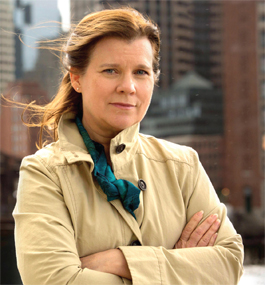Move Aside, and Let Her Get to the Bottom of This

Farhod Family
Elisabeth Elo, PhD'93
by Susan Piland
Yes, Pirio Kasparov grew up on Beacon Hill, the daughter of Russian immigrants who made a fortune in the perfume business. But bad behavior got her thrown into a dreary Maine boarding school in the seventh grade, and as an adult she’s drifted into a general tendency to underachieve.
After the ex-boyfriend of her alcoholic best friend is killed when an unidentified ship slices his lobster boat in half, Pirio decides she has to investigate his death — especially since she was the only other passenger on that lobster boat, the one who managed to stay alive bobbing in the frigid North Atlantic for four hours. She is characteristically cleareyed about this feat of survival. “I was a limp sack of bluish, water-saturated flesh when they found me,” she says. “Nothing there I can take credit for, nothing I want credit for.”
As she searches out her friend’s killers, Pirio is both engine and narrator of “North of Boston,” a new novel by first-time suspense novelist Elisabeth Elo, PhD’93. Pirio is three-dimensional, cynical, not identified by her relationships to men or family — a woman protagonist rarely found in literary thrillers.
“Pirio has a lot of heroic qualities and a lot of integrity,” says Elo.
“She also has a lot of flaws,” Elo continues. “Nobody wants to read perfect characters. They just make us feel inferior. We all want to be good people, but it’s actually quite a lot more difficult than we’re willing to admit. So a character who’s flawed yet struggling to be better elicits our sympathy, because that’s how most of us feel.”
Elisabeth Elo is the pen name of Elisabeth Panttaja Brink, a Milton, Mass., native who earned a bachelor’s in English from Brown. Feeling unfulfilled in the publishing and high-tech marketing jobs she held after graduation, she entered Brandeis’ PhD program in English in her late 20s. Once her doctorate was completed, she considered full-time teaching offers from universities around the country but, reluctant to uproot her family, opted instead for part-time gigs at Harvard, Tufts and, currently, Boston College.
Her swerve into fiction writing was a complete left turn. “One morning, I got up and wrote the entire first draft of a short story that had come to me while I was sleeping,” she says. Even more surprising: A respected literary journal, the Alaska Quarterly Review, snapped it up.
She wrote more short stories. She also wrote nonfiction essays, including the introduction to the new Signet Classics edition of Walt Whitman’s “Leaves of Grass,” published this past November. Her first novel, “Save Your Own,” a comic take on academia, came out in 2006.
 |
|
Sidebar Stories |
 |
For “North of Boston,” published by the Pamela Dorman Books imprint of Viking, the author adopted “Elo” — a Finnish surname that’s a nod to her Finnish-American father — as her suspense-writer moniker.
Writing a suspense novel had never been on her list of must-dos. But “I had the character of Pirio in my mind for eight years,” Elo says. “She needed a big adventure because she’s adventurous. So I wrote ‘North of Boston’ for her.”
Pamela Dorman, VP and publisher of her eponymous imprint, was immediately taken by Elo’s debut thriller. “Pirio is tough, but she has her heart in the right place, and I loved that,” Dorman says. “I also loved how atmospheric this novel is. Elisabeth has written a page turner that is smart, rich and complicated.”
The novel required Elo to do a lot of research — on whales, concocting fragrances, hypothermia, industrial fishing, Newfoundland — resulting in a portrayal of coastal life that’s so seaworthy it drew an admiring blurb from Linda Greenlaw, the Gloucester fisherwoman featured in the book “The Perfect Storm.”
Last summer, to develop a sense of place for the next Pirio novel, which will be set in Boston and Siberia, Elo said goodbye to her husband, 23-year-old son and 16-year-old daughter and left her Brookline home to travel alone for two weeks in Russia. In one tiny village in northeast Siberia, her guide told her she was the first American the villagers had ever seen.
“First-person narration is a direct route into the complexity of a psyche,” says Elo. “But it can feel a little claustrophobic. You never get out of the character’s head. So it’s good to bring the world in, to keep the character engaged in doing things, meeting people.”
Ultimately, she says, good novels act as change agents. Readers should come away “energized to live their own lives better, feeling renewed, recommitted to their goals — or having the courage to make new goals.”
